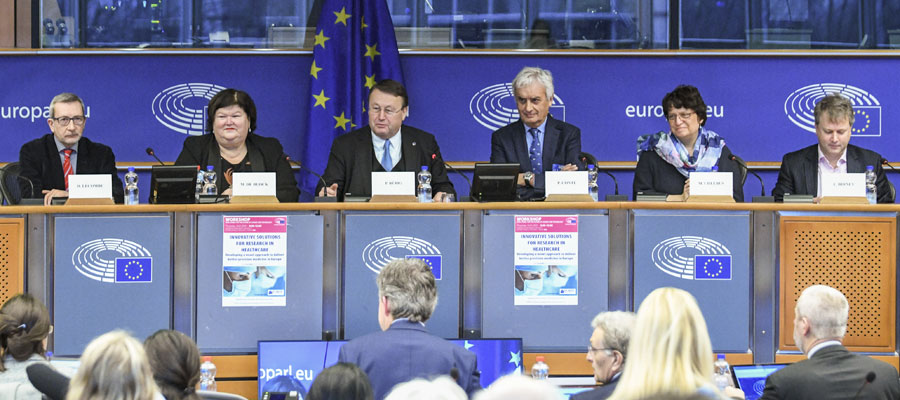EORTC Manifesto on Treatment Optimization: your support needed!
29 Jan 2019
In January this year, EORTC, together with a Science and Technology Options Assessment (STOA), hosted a Workshop on “Developing novel approach to deliver better precision medicines in Europe” in the European Parliament, Brussels.
The STOA panel provides Parliament’s Committees and other parliamentary bodies concerned with independent, high-quality and scientifically impartial studies and information for the assessment of the impact of possibly introducing or promoting new technologies and identifying, from the technological point of view, the options for the best courses of action to take. It organises forums in which decision-makers and representatives of scientific communities and organisations discuss and compare scientific and technological developments of political relevance to civil society.
The objective was to discuss the practical challenges of accessing new precision medicine as well as other treatment strategies. In many instance, there is not enough knowledge on how to use a treatment in the most efficacious way balancing the sometime high costs and toxicities for the patient. The programme addressed the need to optimize patient centered clinical trials, and discuss how to improve treatment in practice for a better use of treatments for all. Clinicians, Industry, Regulators, HTA bodies and Patients were invited to give their view on providing evidence-generated data to define optimal access to treatments. The discussion was underlined by a manifesto complied by EORTC and supported by a number of organisations such as BioMed Alliance, European Alliance for Personalised Medicine, European Patient Forum, European Cancer Patient Coalition, European Federation of Pharmaceutical Industry and Associations and European Biopharmaceutical Enterprises.
Paul Rübig MEP, the STOA Vice Chair, opened the workshop by emphasising the importance of data in healthcare, to establish the best treatment for patients. Rübig’s view is to have a new framework between industry, patients, governments and other stakeholders to optimise the use of medicines.
Belgian Health Minister, Mrs Maggie De Block , attended this workshop. She informed the participants that clinically relevant therapies should be available to all patients. She acknowledged the need for real world evidence to facilitate the best treatment to patients.
Dr Denis Lacombe, EORTC Director General introduced the challenges for precision medicine. He stated that we are in era of therapeutic innovation, which has changed the field of cancer treatment. However, clinical developments, such as selection of patients through biomarkers and genomics, treatment duration, sequence and combination of treatments, are poorly defined for regulatory purposes; leaving gaps in the knowledge of efficacy and therapeutic use of medicines, and this can impose a significant financial burden on healthcare systems.
He emphasised the need for applied clinical research to define effective practice changing approaches to bring therapeutic innovation efficiently and consistently to cancer patients.
“Europe should develop solutions generating the appropriate data sets for optimal access for patients”, he said. “Independent applied clinical research should play a critical role.”
The manifesto calls for reforming the current system to a truly “patient centred” paradigm with coordinated optimisation of treatment in conjunction with drug development. The next step would be to bring the manifesto on the table of the European Council.
Denis Lacombe will now travel to the European Parliament in Strasbourg to discuss this manifesto further.
A report on the event will be available soon. In the meantime, discussions and presentations from the workshop are available here: recording, presentations and photos.
Please view the manifesto here, and send your comments to manifesto@eortc.org. We are grateful for your support.
Related News
Meet the new EORTC Board
9 Jul 2024
We are pleased to announce the release of the EORTC 2023 Annual Report
17 Jun 2024
Dr Denis Lacombe, EORTC CEO, appointed stakeholder co-chair of ACT EU advisory group
24 May 2024
Clinical Trials Day 2024: a Q&A on pragmatic clinical trials
20 May 2024
EORTC/EMA workshop suggests an international way forward for treatment optimisation studies
8 May 2024
EORTC’s Participation at the ESTRO Congress 2024
29 Apr 2024
EORTC: Advancing research and treatment for rare cancers
29 Feb 2024
EORTC Fellowship Programme: celebrating more than 20 years of impactful collaboration
22 Feb 2024
Appointment of Malte Peters as EORTC Strategic Alliance Officer
9 Feb 2024
Unique series of workshops in partnership with the European Medicines Agency (EMA)
7 Feb 2024


